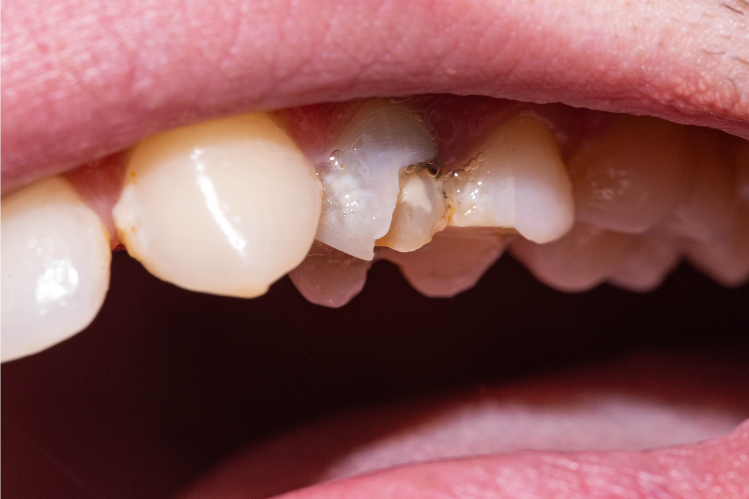
Although a chipped tooth may feel like a minor dental issue, it’s something that can easily become a painful, costly issue if left untreated. Whether it's a chipped front tooth impacting your smile or a chipped molar resulting in an uncomfortable chewing experience, understanding the causes, recognizing the warning signs of chipped teeth, and knowing how to repair them is crucial.
In this comprehensive guide, we’ll talk about everything related to chipped teeth, why they happen, how to detect them, and the best ways to repair them.
Understanding a Chipped Tooth
A chipped tooth occurs when a part of your tooth enamel breaks off, exposing the inner layers of the tooth. Depending on the size and severity of the chip, it can range from a barely noticeable cosmetic issue to a painful condition requiring immediate dental treatment. While enamel is the hardest substance in the body, it’s not indestructible. Repeated wear, accidents, or underlying health conditions can cause a chip. The damage may occur in any tooth, but chipped front teeth and chipped molars are the most common cases.
Causes of a Chipped Tooth
Accidents and Trauma
Sudden impacts are among the top reasons people visit dentists for chipped or broken teeth. Car accidents, falls, sports-related injuries, or even an unexpected blow to the face can result in a chipped tooth. Since the front teeth are most exposed, they are more vulnerable to direct trauma. For example, slipping on a wet floor and hitting your mouth or colliding with another player during a football game can chip or fracture a front tooth instantly. Even seemingly small accidents, like bumping into a hard object, can cause noticeable damage.
Teeth Grinding (Bruxism)
Bruxism is an involuntary habit of grinding or clenching the teeth, often during sleep. This constant pressure gradually erodes the enamel, the protective outer layer of the tooth, making it thinner and weaker. When enamel wears down, teeth become brittle and more likely to chip. Over time, even something as simple as chewing bread or soft food may cause a chipped or broken cavity tooth. Many people with bruxism also experience jaw pain, headaches, and tooth sensitivity, further signaling enamel damage.
Biting Hard Foods
While teeth are strong, they aren’t indestructible. Crunching down on hard foods like ice cubes, unpopped popcorn kernels, hard candies, or nuts can put excessive pressure on enamel, causing small cracks or chips. If teeth are already weakened due to decay or grinding, the risk is even higher. A chipped molar often results from chewing on something unexpectedly hard, like a bone fragment in meat or a kernel hidden in popcorn.
Large Cavities or Tooth Decay
Tooth decay weakens the internal structure of teeth by creating hollow spaces (cavities). When a cavity gets large, the tooth loses its strength and stability. At this stage, even minor biting pressure or chewing soft foods can cause part of the tooth to chip off. This is why patients often experience a broken cavity or chipped tooth; the tooth is already structurally compromised and unable to withstand everyday use.
Age-Related Wear
As people age, enamel naturally wears down from decades of chewing, grinding, and exposure to acidic foods and drinks. This gradual thinning of enamel makes teeth more fragile and prone to chips. For older adults, even biting into something as soft as bread or fruit can sometimes result in small chips. Additionally, gums recede with age, exposing more of the tooth’s root, which is not as strong as enamel, increasing vulnerability.
Stress and Lifestyle Factors
Stress has indirect but significant effects on dental health. Many people cope with stress through habits like grinding teeth (bruxism), clenching jaws, chewing on pens or pencils, or biting nails. These habits may seem harmless, but they create constant wear and tear on enamel. Over time, this makes teeth much more likely to chip. In fact, stress-induced grinding at night is one of the most common reasons adults develop chips and cracks in their teeth.
Medical Conditions
Certain health issues make teeth more prone to chipping:
- Acid Reflux (GERD): Frequent stomach acid exposure erodes enamel, leaving teeth weak.
- Eating Disorders (e.g., bulimia): Regular vomiting introduces stomach acid into the mouth, severely damaging enamel.
- Enamel Hypoplasia: A developmental condition where enamel is thin or defective from childhood.
- Osteoporosis: A condition that weakens bones, including jawbone support, making teeth more fragile.
- Dry Mouth (Xerostomia): Reduced saliva flow prevents natural neutralization of acids, accelerating enamel wear.
These conditions don’t just affect oral health—they make teeth more brittle and susceptible to breaking, sometimes even without major trauma.
Chipped Tooth Symptoms
Sometimes, a chipped tooth is obvious; you can see or feel the broken edge. Other times, the signs may be subtle.
Common symptoms include
- Visible cracks or missing enamel.
- Tooth sensitivity when exposed to hot, cold, or sweet foods.
- Sharp edges that irritate your tongue or cheeks.
- Pain when chewing, especially if the chip reaches the dentin or pulp.
- Swelling or discomfort around the affected tooth.
If you notice these chipped tooth symptoms, it’s important to see a dentist promptly.
Chipped Tooth: What to Do Immediately
If you chip a tooth, here’s what you should do before reaching the dentist:
- Rinse your mouth with warm salt water to prevent infection.
- Save the broken piece of tooth if possible.
- Apply dental wax or sugar-free gum over sharp edges to protect your mouth.
- Use a cold compress on your face to reduce swelling.
- Take over-the-counter pain relievers if you’re in pain.
Avoid biting on the damaged tooth until you receive professional chipped tooth repair.
How to Fix a Chipped Tooth at Home
While professional dental care is always the best solution, there are some temporary fixes you can try:
- Dental wax or bonding kits can smooth sharp edges.
- Temporary dental cement can be used if the chip is large.
- Good oral hygiene, brushing gently and rinsing with mouthwash, helps prevent infection.
- Wearing a dental night guard to prevent your teeth from grinding.
Professional Chipped Tooth Repair Options
Dental Bonding
Dental bonding is one of the simplest and most cost-effective ways to repair a chipped tooth, especially small chips on the front teeth. In this treatment, a tooth-colored resin is applied to the affected area, shaped to blend seamlessly with your natural tooth, and hardened using a special light. The result is a natural-looking restoration that can usually be completed in just one visit. While bonding provides a quick fix, it is less durable than other options and may require maintenance over time.
Dental Veneers
For larger chips or patients who want to enhance the appearance of their smile, dental veneers are a popular choice. A veneer is a thin porcelain or composite shell that is bonded to the front of the tooth to mask imperfections. Veneers not only cover chips but also correct discoloration, uneven shapes, and small gaps, giving the teeth a flawless and durable finish. They provide a long-lasting cosmetic solution, though the process involves removing a thin layer of enamel, making it a permanent change.
Dental Crowns
When a tooth has sustained significant damage or when molars are chipped, a dental crown is often the most reliable treatment. A crown completely covers the damaged tooth, restoring its strength, function, and appearance. This option is particularly useful for protecting teeth weakened by large chips or decay, as crowns are strong enough to handle chewing pressure. With proper care, crowns can last for many years, offering both protection and a natural look.
Root Canal Treatment
In cases where the chip is so deep that it exposes the tooth’s pulp or nerve, a root canal may be necessary. During this procedure, the dentist removes the damaged or infected pulp, cleans and seals the tooth, and often completes the treatment with a crown to restore its strength. Root canals not only relieve pain and sensitivity but also save teeth that might otherwise need to be extracted, making them a vital option for severe dental injuries.
Dental Implants or Bridges
If a chipped tooth is too severely damaged to be repaired, replacement options like dental implants or bridges are recommended. A dental implant involves placing a titanium post in the jawbone, which acts as an artificial root, topped with a crown for a permanent solution. Bridges, on the other hand, fill the gap by anchoring a false tooth to the surrounding natural teeth. Both options restore function, appearance, and confidence, ensuring that even when a tooth cannot be saved, your smile remains complete.
Risks of Leaving a Chipped Tooth Untreated
Some people wonder if it’s okay to leave a chipped tooth untreated. The short answer is no.
Risks include:
- Increased sensitivity and pain.
- Higher risk of tooth decay and infection.
- Potential for the chip to worsen into a fracture.
- Gum irritation and soft tissue injuries.
- Impact on chewing and bite alignment.
Even if it seems minor, always seek chipped tooth repair to prevent long-term damage.
Preventing a Chipped Tooth
While not all chips can be avoided, you can reduce your risk:
- Wear a mouthguard during sports.
- Avoid biting on ice, pens, or hard foods.
- Treat teeth grinding with a night guard.
- Maintain strong enamel with a balanced diet and fluoride toothpaste.
- Get regular dental checkups.
Chipped Tooth Repair
A chipped tooth is more than a cosmetic issue; it’s a warning sign that your oral health needs attention. From chipped front teeth affecting your smile to chipped molars that interfere with chewing, prompt care is essential. The good news is that chipped tooth repair is highly effective today. Whether through bonding, crowns, or veneers, dentists can restore both function and aesthetics. So if you ever find yourself thinking, “I have a chipped tooth, what do I do?”, the answer is simple: seek professional help right away. Early treatment ensures you keep your smile healthy, strong, and beautiful.
FAQs
1. Is it okay to leave a tooth chipped?
Leaving a chipped tooth untreated is not recommended. Even small chips can expose enamel and dentin, making the tooth vulnerable to decay, sensitivity, and further breakage. Prompt dental evaluation is best.
2. Is it possible to fix a chipped tooth?
Yes. Chipped teeth can often be repaired with dental bonding, veneers, crowns, or, in severe cases, root canal therapy. The right treatment depends on the size and location of the chip.
3. Why did a tiny piece of my tooth break off?
Small breaks usually occur due to enamel weakness, grinding (bruxism), biting hard foods, or existing cavities. Even a minor fracture signals that the tooth may need protection.
4. How to tell if a chipped tooth is serious?
If the chip causes pain, exposes a sharp edge, or shows visible cracks extending deeper, it’s serious. Discoloration, swelling, or sensitivity to hot/cold are also warning signs.
5. How long can a chipped tooth go untreated?
A minor chip might not cause immediate issues, but untreated chips can worsen within weeks or months, leading to decay, infection, or tooth loss. Timely repair is safest.
6. Can stress cause teeth to chip?
Indirectly, yes. Stress often leads to teeth grinding or jaw clenching, which weakens enamel over time and increases the risk of chips and cracks.
7. What diseases cause teeth to break?
Conditions like osteoporosis, diabetes, acid reflux, and enamel hypoplasia can weaken teeth. Poor oral hygiene and untreated cavities also increase breakage risk.
8. Are small chips in teeth normal?
Tiny chips are fairly common, especially on front teeth, but they should not be ignored. Even small damage can progress if left untreated.
9. Why does my front tooth keep chipping?
Recurrent chips may be due to enamel erosion, bite misalignment, teeth grinding, or hidden cavities. A dentist can assess the root cause and suggest protective treatments.
Citations:
Kakka A, Gavriil D, Whitworth J. Treatment of cracked teeth: A comprehensive narrative review (https://www.ncbi.nlm.nih.gov/pmc/articles/PMC9562569/). Clin Exp Dent Res. 2022;8(5):1218-1248. Accessed 4/28/2024.
Chipped tooth. (2025, August 18). Cleveland Clinic. https://my.clevelandclinic.org/health/diseases/chipped-tooth
Dunkin, M. A. (2025b, January 20). Repairing a chipped or broken tooth. WebMD. https://www.webmd.com/oral-health/repairing-a-chipped-or-broken-tooth





